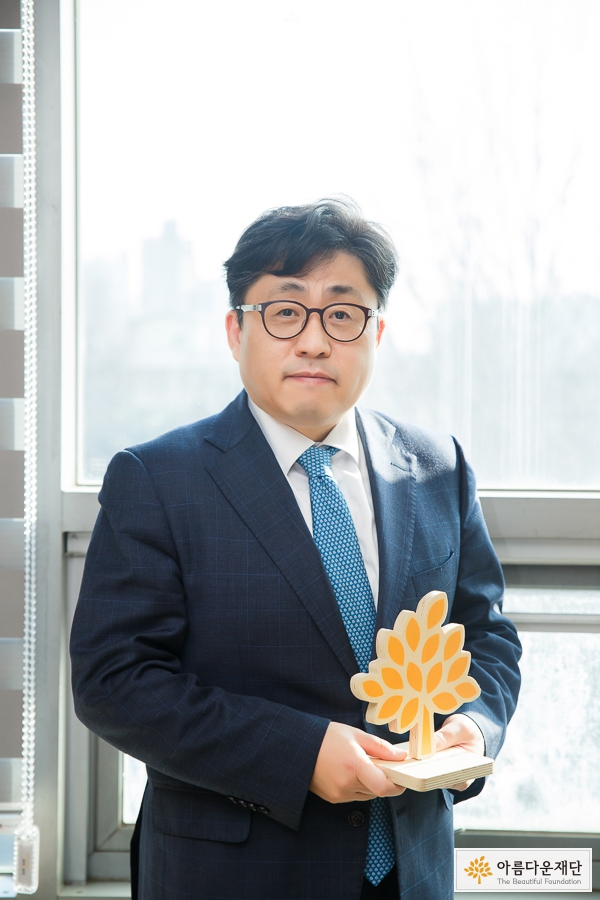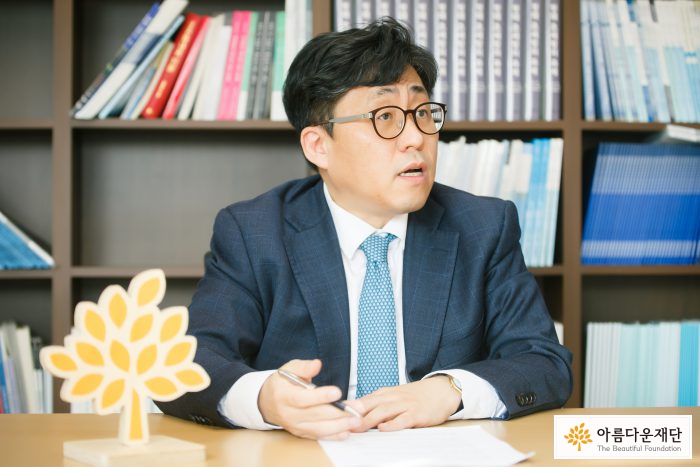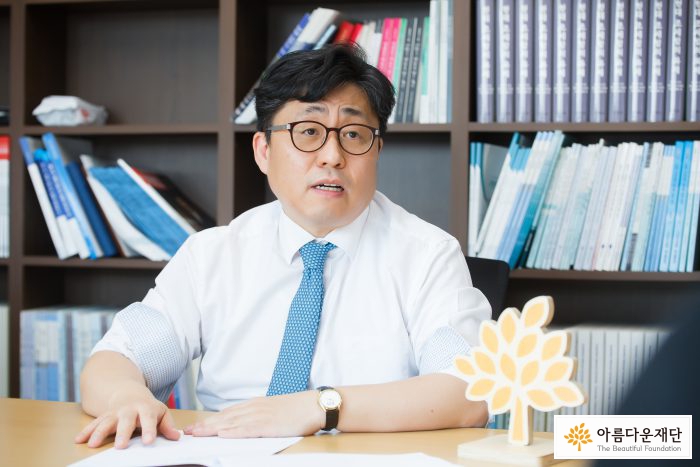“I hope to contribute to building more trust in philanthropy”
Interview with Professor Hun Park
New Director of The Center on Philanthropy at The Beautiful Foundation
|
Professor Hun Park of University of Seoul is the new director of The Center on Philanthropy at The Beautiful Foundation. Under his expertise in laws related to giving, policy changes that contribute to the advancement of philanthropy are looked forward to. In this interview, Director Park talks about his appointment as director and his relationship with the Center that began in 2003. He also shares about what he hopes to achieve for the advancement of philanthropy during his tenure. |
Q. Congratulations on your appointment. Could you introduce yourself and how you first started to work with The Center on Philanthropy?
I have a background in law and have been teaching tax law, inheritance tax, gift tax, etc. at University of Seoul since 2003. I first joined the Center in 2008 as a researcher through then director, Professor Yun-hi Won. At the time, the Center had many experts in other fields, but there was an internal need for a law specialist. I remember the first study I conducted was on the ‘improvement of the tax law system to promote giving.’
Q. You are a law major researching the nonprofit and philanthropy sector. As 0pposed to other more common backgrounds related to this field such as social welfare and economics, your perspective of Korea’s philanthropy might be quite different.
Once I started studying a certain topic, the next one came naturally. I have participated in numerous presentations and debates on issues related to laws on giving and nonprofits such as stock donations or service donations and on tax benefits of giving. When I first started research in this area, the hot topic was ‘stock donations’; then later it was ‘planned giving.’ When I visited the US and Japan during my sabbatical, I learned each country’s giving trends. I can remember, during the visa interview to visit the US for my sabbatical, I said the purpose of my research was ‘to study the tax on giving,’ and the interviewer at the US embassy found this interesting and asked many questions.
Regarding my perspective on giving from a legal background, I think my approach is quite different from experts in economics or social welfare. For a good idea on giving to be possible in reality, it needs to come into effect through the existing legal system. Moreover, when we communicate with government institutions, we speak in terms of the law.
Q. In your opinion, where does Korea’s philanthropy today stand?
Negative articles are written on giving or charitable organizations, and the issue of transparency is brought to the forefront in the process. On the other hand, stories of rich people donating over 1 trillion won is empowering philanthropy in a meaningful way. Amidst this, while it is important for the state to support public interest systems, I think it is becoming more crucial for the private sector to also play a role. Scandals on giving need to be addressed with the existing policies, and the philanthropy ecosystem should be given enough space to filter out these problems on its own. Unlike the state, the private sector can respond more quickly at a micro-level. I think the private sector should be able to find the appropriate areas to work on independently.
Q. Over the years that you have been a part of The Center on Philanthropy, what has stood out to you?
I have been most impressed with Giving Korea, with its archive that spans two decades. There are activities that disappear after a short period or have to be ended because they are unsustainable. It is an incredible achievement for the Center to be conducting Giving Korea for over twenty years. On top of this, I think the Center has a well-established network of researchers. They are from diverse backgrounds, and personally, this is highly motivating for me as a scholar.
Q. Please share your plans for the future operations of the Center.
I plan to prioritize the giving index related to Giving Korea 2021 and will work towards providing alternatives in philanthropy through the active participation of our researchers. I am also considering scouting researchers from among those working in the field. The Center will also advance the efforts to support new and up-and-coming researchers of philanthropy.
Q. Are there any words you would like to share with the Center’s staff and the public who will be observing the Center’s activities?
I have been a supporter of the Center as a volunteer, consultant, and deputy director. I will continue to think hard on what I could do with the people I will be working with. I intend to communicate with them as one expert to another.
To the general public, I want to encourage people not to think of giving as something difficult to do. Charitable organizations and donors aren’t independent of each other. ‘Giving’ could be seen as the medium that connects organizations and donors to work together for social change. In this respect, Giving Korea will expand the forum for trust and interest in giving.



댓글 Comment